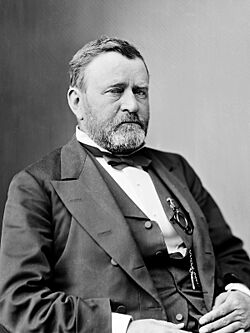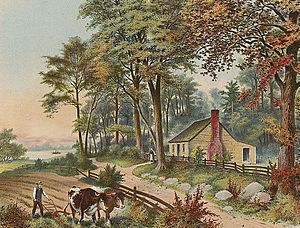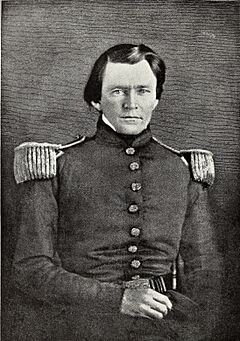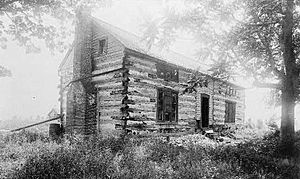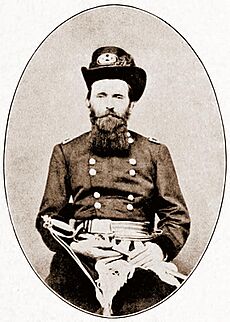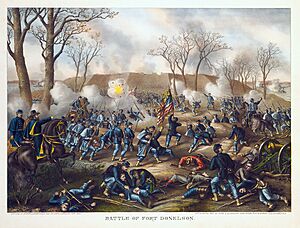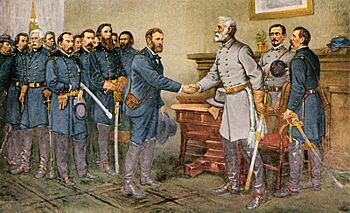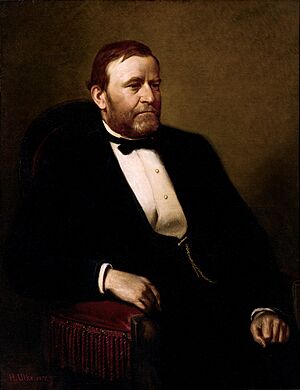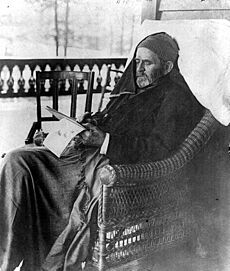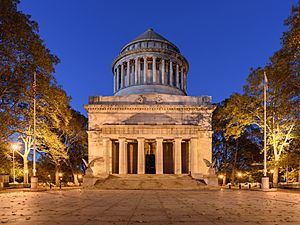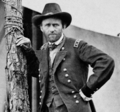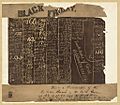Ulysses S. Grant facts for kids
Quick facts for kids
Ulysses S. Grant
|
|
|---|---|
|
Grant, around 1870–1880
|
|
| 18th President of the United States | |
| In office March 4, 1869 – March 4, 1877 |
|
| Vice President |
|
| Preceded by | Andrew Johnson |
| Succeeded by | Rutherford B. Hayes |
| Commanding General of the U.S. Army | |
| In office March 9, 1864 – March 4, 1869 |
|
| President |
|
| Preceded by | Henry Halleck |
| Succeeded by | William Tecumseh Sherman |
| Acting United States Secretary of War | |
| In office August 12, 1867 – January 14, 1868 |
|
| President | Andrew Johnson |
| Preceded by | Edwin Stanton |
| Succeeded by | Edwin Stanton |
| President of the National Rifle Association | |
| In office 1883–1884 |
|
| Preceded by | E. L. Molineux |
| Succeeded by | Philip Sheridan |
| Personal details | |
| Born |
Hiram Ulysses Grant
April 27, 1822 Point Pleasant, Ohio, U.S. |
| Died | July 23, 1885 (aged 63) Wilton, New York, U.S. |
| Resting place | Grant's Tomb, New York City |
| Political party | Republican |
| Spouse | |
| Children |
|
| Parents |
|
| Education | United States Military Academy |
| Occupation |
|
| Signature | |
| Nicknames |
|
| Military service | |
| Branch/service | |
| Years of service |
|
| Rank |
|
| Commands |
|
| Battles/wars | |
Ulysses S. Grant (born Hiram Ulysses Grant; April 27, 1822 – July 23, 1885) was an American military leader. He was the 18th president of the United States from 1869 to 1877. As the main general of the Union Army, he helped the United States win the American Civil War in 1865.
Grant was born in Ohio and went to the United States Military Academy at West Point. He did a good job in the Mexican–American War but left the army in 1854. When the Civil War started in 1861, he rejoined the army. He won key battles that helped the Union control the Mississippi River. President Abraham Lincoln trusted Grant. He made Grant the commander of all Union armies in 1864. Grant's armies defeated the Confederate general Robert E. Lee. This led to the end of the war.
As president, Grant worked to rebuild the country after the war. This time was called Reconstruction. He worked to protect the rights of African Americans. He used the army to stop the Ku Klux Klan, a violent group. He also created the United States Department of Justice. Grant was reelected in 1872. However, his second term had problems with some government officials. His plans for Native Americans focused on peace. He hoped they would become part of American culture.
After his presidency, Grant traveled the world. Later in life, he lost all his money in a bad business deal. To help his family, he wrote a book about his life. It became a bestseller. Grant died of throat cancer in 1885. He is remembered as the general who won the Civil War. He is also seen as a president who fought for civil rights.
Contents
Early Life and Education
Hiram Ulysses Grant was born in Point Pleasant, Ohio, on April 27, 1822. His father, Jesse Root Grant, worked with leather and was strongly against slavery. His mother was Hannah Simpson Grant. In 1823, his family moved to Georgetown, Ohio. Grant grew up there with his five younger brothers and sisters.
Grant was a very good horse rider from a young age. He was quiet and did not like working in his father's leather shop. He went to several schools and was a good student.
When Grant was 17, his father arranged for him to go to the United States Military Academy at West Point, New York. The politician who sent him made a mistake. He wrote Grant's name as "Ulysses S. Grant." Grant decided to keep this new name. At West Point, his friends called him "Sam." This was because his initials "U.S." also stood for "Uncle Sam."
Grant was not very interested in army life at first. But he was an excellent horseman. He finished school in 1843. He then became a second lieutenant in the army.
Military Career and Family Life
Mexican-American War Experience
Grant's first big war was the Mexican–American War (1846–1848). He worked under Generals Zachary Taylor and Winfield Scott. He was in charge of supplies, but he wanted to fight.
He showed great courage in battle. At the Battle of Monterrey, he rode his horse through enemy fire to deliver a message. He also helped his men use a cannon from a church tower. This happened during the fighting in Mexico City. For his bravery, he was promoted twice. Grant learned a lot about leading soldiers during the war. However, he later wrote that he thought the war was unfair. He believed it was fought to spread slavery.
Marriage and Children
While in Missouri, Grant met Julia Dent. She was the sister of a friend from West Point. They got engaged and married on August 22, 1848. Grant's father did not like slavery. He did not go to the wedding because Julia's family owned slaves. Ulysses and Julia had four children: Frederick, Ulysses Jr., Ellen (Nellie), and Jesse.
Leaving the Army
After the war, Grant was sent to different army bases. Some were on the West Coast. He was lonely without his family. He faced some personal difficulties. In 1854, he left the army. He returned to his family in Missouri.
Civilian Life Struggles
For the next seven years, Grant had money problems. He tried farming on land his father-in-law gave him. He built a log cabin he called "Hardscrabble." But the farm did not do well. He also tried working as a real estate agent and collecting bills. These jobs also did not work out.
In 1858, Grant's father-in-law gave him a slave named William Jones. Grant did not like slavery. He freed Jones in 1859 instead of selling him.
In 1860, Grant moved his family to Galena, Illinois. He worked in his father's leather goods store. He was finally able to pay off his debts. He started to live a more stable life.
American Civil War Hero
The Civil War began on April 12, 1861. President Lincoln asked people to join the Union Army. Grant helped find soldiers in Illinois. He was soon made a colonel. Because of his experience, he was quickly promoted to brigadier general.
Early Victories in the West
Grant's first big wins happened in February 1862. He captured Fort Henry and Fort Donelson in Tennessee. These forts were important Confederate places. At Fort Donelson, Grant demanded that the Confederate army surrender "unconditionally and immediately." This earned him the nickname "Unconditional Surrender" Grant. This victory made him a hero in the North. Lincoln promoted him to major general.
Battle of Shiloh
In April 1862, Grant's army was surprised by a Confederate attack at the Battle of Shiloh. The first day of the battle was almost a disaster for the Union. But Grant did not give up. With more soldiers, he led a counterattack the next day and won the battle.
Shiloh was one of the bloodiest battles of the war so far. Many people in the North were shocked by how many soldiers died. They blamed Grant. But President Lincoln defended him. He said, "I can't spare this man; he fights."
Vicksburg Campaign Success
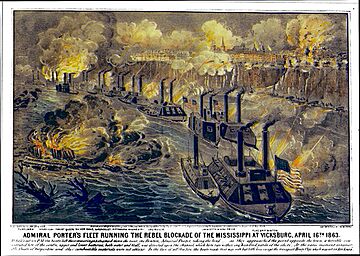
Grant's smartest plan was the Vicksburg campaign in 1863. The city of Vicksburg, Mississippi, was the last Confederate stronghold on the Mississippi River. Capturing it would split the Confederacy in two.
After trying several times and failing, Grant marched his army down the other side of the river. Then, navy gunboats secretly sailed past the Vicksburg cannons at night. His army crossed the river. They attacked the Confederates from behind. After many battles, he trapped the Confederate army inside Vicksburg. The siege lasted for 47 days. On July 4, 1863, the Confederates gave up. This was a huge victory for the Union.
Commander of All Union Armies
After another big win at the Battle of Chattanooga, President Lincoln promoted Grant. In March 1864, he became a lieutenant general. This rank had only been held by George Washington before. Grant was now in charge of all Union armies.
Grant's plan was to attack the Confederacy everywhere at once. He traveled with the main army in the east. He fought General Robert E. Lee's army in Virginia. At the same time, his friend General William Tecumseh Sherman attacked Atlanta, Georgia.
The fighting in Virginia was very tough. In battles like the Battle of the Wilderness and Battle of Cold Harbor, many Union soldiers were hurt or killed. But unlike other generals, Grant did not retreat. He kept moving forward. He wore down Lee's army.
End of the War
Grant trapped Lee's army at the city of Petersburg for nine months. Finally, on April 2, 1865, Lee's army had to retreat. Grant's army chased them. They surrounded them at Appomattox Court House.
On April 9, 1865, Lee surrendered to Grant. Grant offered fair terms to the Confederate soldiers. He let them keep their horses and go home peacefully. He told his cheering soldiers, "The war is over; the rebels are our countrymen again." The Civil War was finally over.
Presidency (1869–1877)
Ulysses S. Grant was a war hero. The Republican Party chose him to run for president in 1868. He won the election. He became the 18th president of the United States. At 46, he was the youngest president elected at that time.
Reconstruction and Civil Rights
Grant's main goal as president was to continue Reconstruction. This was the process of bringing the Southern states back into the Union. It also meant protecting the rights of newly freed African Americans.
- Fifteenth Amendment: Grant supported the Fifteenth Amendment. This law gave African American men the right to vote. It became law in 1870.
- Fighting the KKK: He used the power of the government to fight the Ku Klux Klan. He signed laws called the Enforcement Acts. These laws made it a federal crime to stop someone from voting. He sent soldiers to the South to arrest Klan members. By 1872, the Klan was almost gone.
- Department of Justice: In 1870, Grant created the United States Department of Justice. Its job was to make sure federal laws were followed and to protect civil rights.
During Grant's time as president, the Union was fully put back together. For the first time, African American men served in the U.S. Congress.
Native American Policy
Grant wanted to have a more peaceful plan for Native Americans. He chose the first Native American, Ely S. Parker, to be in charge of Indian Affairs. Grant's "Peace Policy" aimed to move tribes onto special lands called reservations. There, they would be taught farming and Christianity. He hoped this would lead to them becoming U.S. citizens.
However, the policy had many problems. As more settlers moved west, conflicts continued. The Great Sioux War of 1876 happened during his presidency. This war included the Battle of the Little Bighorn.
Foreign Policy Achievements
Grant's Secretary of State, Hamilton Fish, handled foreign affairs well. They peacefully solved the Alabama Claims with Great Britain. Britain paid the U.S. $15.5 million. This was for damage done by Confederate ships built in British shipyards during the Civil War.
Grant also tried to add the Caribbean nation of Santo Domingo (now the Dominican Republic) to the U.S. He believed it would be good for the U.S. and a safe place for African Americans. However, the Senate did not approve the plan.
Challenges and Scandals
Grant's second term was difficult. In 1873, a big economic crisis started. It was called the Panic of 1873. It led to a long time of economic trouble with many people losing jobs.
His government also faced several problems. Some of the officials he chose were involved in dishonest actions. Grant himself was honest. But these problems hurt his reputation. Because of these issues, and a desire to end Reconstruction, the Democratic Party gained control of the House of Representatives in 1874.
Later Life and Legacy
After leaving the presidency in 1877, Grant and his wife Julia took a trip around the world. They met famous leaders like Queen Victoria of Great Britain and Otto von Bismarck of Germany.
In 1880, some Republicans tried to get Grant to run for president a third time. But he did not win the nomination.
Final Years and Memoirs
In 1884, Grant lost all his money in a bad business deal. At the same time, he learned he was dying of throat cancer. To leave money for his family, Grant decided to write his life story.
He worked very hard, even as he became very sick. He finished the book just days before he died on July 23, 1885. His book, the Personal Memoirs of U. S. Grant, was a huge success. It earned his family a lot of money. It is still considered one of the best military memoirs ever written.
Grant's Legacy
When he died, Grant was one of the most admired Americans. He was buried in a huge tomb in New York City. It is now known as Grant's Tomb.
For many years, historians focused on the problems during his presidency. They saw him as a poor leader. However, in recent years, historians have praised him. They recognize his brilliant military skills. They also praise his efforts to protect African Americans and seek fairness for everyone. Today, he is seen as a great general and an important, though complex, president.
Images for kids
-
The Battle of Monterrey during which Grant saw military action
-
The Battle of Jackson, fought on May 14, 1863, was part of the Vicksburg Campaign.
-
Union troops swarm Missionary Ridge and defeat Bragg's army.
-
General Grant at his headquarters in Cold Harbor, Virginia, June 1864
-
Grant (center left) next to Lincoln with General Sherman (far left) and Admiral Porter (right) – The Peacemakers by George Peter Alexander Healy, 1868
-
Amos T. Akerman, appointed Attorney General by Grant, who strongly prosecuted the Ku Klux Klan
-
Secretary of State Hamilton Fish helped settle the Alabama Claims by treaty.
-
King Kalākaua of Hawaii meets President Grant at the White House during his state visit in 1874.
-
Ely Samuel Parker, a Seneca man appointed by Grant as Commissioner of Indian Affairs
-
The Battle of the Little Big Horn, 1876
-
A cartoon by Thomas Nast about Grant's opponents in the 1872 election campaign
See also
 In Spanish: Ulysses S. Grant para niños
In Spanish: Ulysses S. Grant para niños
 | Delilah Pierce |
 | Gordon Parks |
 | Augusta Savage |
 | Charles Ethan Porter |


